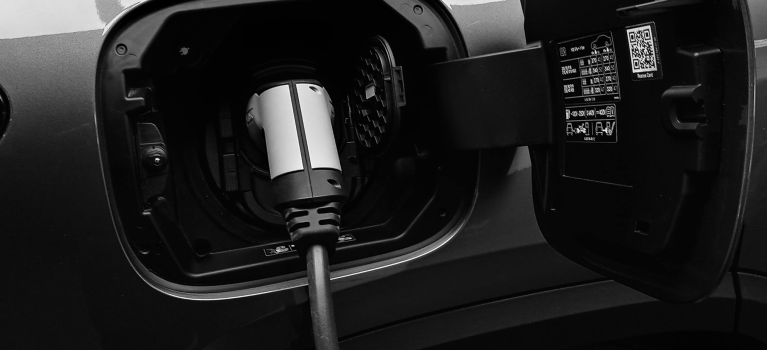- What exactly is a hybrid car?
- How does a (Plug-in) hybrid car work?
- Hybrid vs. Plug-in hybrid – What types of hybrid cars are available?
- How is a hybrid car charged, and what’s the difference from an electric car?
- What are the advantages and disadvantages of a hybrid vehicle?
- A hybrid car as a company vehicle – Is it worth it?
- Hybrid cars at Carvolution – Discover the all-inclusive car subscription!
Almost every manufacturer offers them nowadays. Hybrid cars have become a well-established vehicle category, competing with petrol, diesel, and electric vehicles. But what exactly is a hybrid car? What’s the difference between a hybrid and a plug-in hybrid?
And ultimately, does it make sense to drive or buy a hybrid car? You'll find all the answers in this blog post.
What exactly is a hybrid car?
The word "hybrid" generally refers to something combined, crossed, or mixed. This concept can be applied to a hybrid car, where it refers to a combination of a combustion engine and an electric motor.
How does a (Plug-in) hybrid car work?
Although different types of hybrid vehicles differ, as explained below, a hybrid vehicle typically runs on both an electric motor and a combustion engine. A control system in the vehicle determines when each motor is used.
In smooth, steady city driving, the electric motor is often used, which also helps with starting due to its more direct transmission. Additionally, energy can be recovered through regenerative braking and stored in the battery.
The diesel or petrol engine, on the other hand, provides additional range and higher speeds for the driver. Overall, a hybrid engine combines the best of both worlds.
Hybrid vs. Plug-in hybrid – What types of hybrid cars are available?
There are not only various models and manufacturers of hybrid cars, but also significant differences between types of hybrid engines. Since not all hybrids are the same, here's a list of the most common variants.
Full hybrid: A full hybrid car, with over 20 kilowatts, can run solely on electric power but is primarily powered by the combustion engine. The car cannot be charged via a cable, as the combustion engine supports the electric motor.
Mild hybrid: A mild hybrid also uses an electric motor, but the power is not sufficient to drive the car alone. It only assists the combustion engine.
Plug-in hybrid: The plug-in hybrid can be charged via a power source and has a larger capacity battery. Depending on the model, long distances can be driven purely on electric power.
How is a hybrid car charged, and what’s the difference from an electric car?
While plug-in hybrids can be charged at an outlet, other hybrid variants rely on the combustion engine to support the electric motor, which in turn charges the battery.
In general, all models benefit from lower fuel consumption due to the electric motor, reducing not only costs but also greenhouse gas emissions.
You can save even more if you drive with a Carvolution car subscription. With a plug-in hybrid, you can use the evpass card to charge your hybrid at discounted rates—10 cents off as of August 2024.
If you have another type of hybrid, you’ll need to refuel. But with our AVIA fuel card, you can also save 5 cents per liter.
What are the advantages and disadvantages of a hybrid vehicle?
If you're interested in a hybrid car, you're likely wondering about the pros and cons. Here's a summary of the most important points:
Advantages:
Lower consumption: Due to the electric motor, fuel savings of about 15 to 25 percent are possible, depending on the type of hybrid, compared to a petrol engine. Consumption is especially low for short city trips, known as stop-and-go driving.
Acceleration: Hybrid cars also have about 10 to 20 percent better acceleration, according to ADAC, as the electric motor supports the combustion engine, especially at low RPMs.
Quiet driving: Thanks to the electric motor, which is often used in city driving, you can enjoy quiet and comfortable driving in everyday life.
Disadvantages:
Higher initial costs: Although hybrid car prices are evolving dynamically, the purchase price is still usually higher than other types of vehicles. A Carvolution car subscription with a fixed monthly fee could help keep costs in check.
Higher weight: Due to the use of two engines, the car is heavier, which can counteract the fuel-saving benefits.
Less space: Although there are now hybrids with high cargo volumes, the two engines and the battery take up a lot of space.
A hybrid car as a company vehicle – Is it worth it?
For business customers, like Luca from L&R, a hybrid vehicle can be a great choice. Especially if you want to make your fleet more sustainable, enjoy quieter driving, and save costs with lower fuel consumption. It's also a good option for field staff who need more range than fully electric vehicles can offer.
In addition, a hybrid car might have tax benefits compared to petrol or diesel vehicles when it comes to company car taxation in Switzerland. We recommend checking the tax situation before purchasing, leasing, or subscribing to a hybrid vehicle.
Hybrid cars at Carvolution – Discover the all-inclusive car subscription!
If you'd like to drive a nearly new hybrid car, whether for a few months as a trial or for several years, the Carvolution car subscription is perfect for you.
The all-inclusive subscription covers not only the plug-in, mild, or full hybrid but also insurance, registration, taxes, service, maintenance, and tires.
Simply choose a duration between 3 and 48 months, a mileage package between 350 km and 3,250 km, and tailor the subscription to your needs. You can choose from small cars, SUVs, station wagons, and more.
Interested in a hybrid car or have more questions about Carvolution and the car subscription? Our team is always happy to offer you anon-binding consultation.
SUPER SALE
Benefit from the super price of the Seat Ibiza Style from just CHF 216.- per month and get an additional 2'000 kilometres for free. Request a non-binding offer now!










